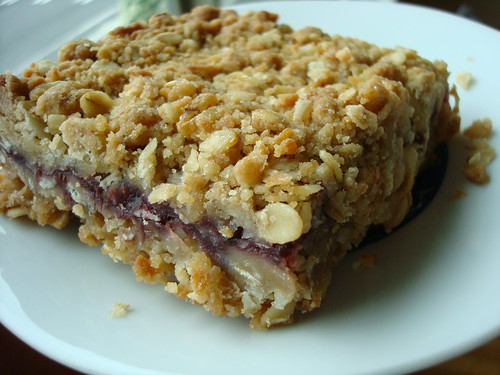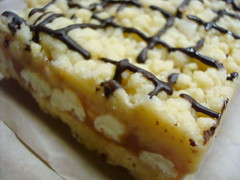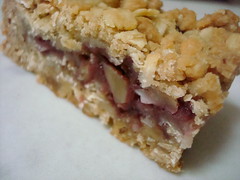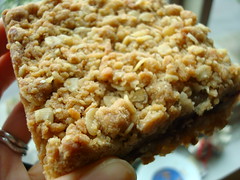Note: Here's a post from many years ago, near the start of CakeSpy, that I really thought was worth revisiting. Enjoy!

(Mazurka pictured made by ace pastry chef Chris Jarchow)
Have you ever stopped to wonder why certain baked goods are popular in your area?
For me, the discovery of a popular Seattle area treat, the fruit-and-oat bar, which is at times known by various names, started with this book:
The Baker's Apprentice
This is a book by Judith Ryan Hendricks, which I picked up at random at the library last year. Turns out, the novel, which is about a thirty-something woman who is finding herself as a breadmaker after a nasty divorce (which is actually the sequel to the writer's previous novel, Bread Alone) is set in Seattle, and fictional as it may be, the "Queen Street Bakery" featured in the book is inspired by an actual bakery (the McGraw Street Bakery--now Macrina Bakery). But even more than this fact, what caught our attention was one pastry in particular in the book, which turns out to be real as well: the Mazurka Bar.
In the book, the baked good is described as:
"locally world famous--a killer combination of thin, flaky crust, then your choice of lemon, chocolat-espresso, apple-raisin, or raspberry filling, and on the top the crumble layer with its habit-forming, sandy crunch".

Reading this, we got a shiver of excitement. We had noticed the proliferation of this fruit-and-oat cookie bar format in the Seattle area--though known by several different names, nearly every coffee shop or bakery in the area has some variation (several are pictured throughout this writeup). Could this mysterious Mazurka hold the key to this particular bar cookie's popularity in Seattle?
An obsession was born.
I started out by emailing the writer Judith herself, who pointed us in the right direction in our Mazurka hunt, which eventually led us to the Mazurka Maven herself--Jessica Reisman, former owner of the McGraw Street Bakery and the woman who introduced the Mazurka to Seattle. Though Jessica now lives in Beacon, NY (where she owns a different cafe, the charming-looking Homespun Foods), she was more than happy to share the story of the mysterious bar with us:

The path to Mazurka monopoly began in 1983, when Jessica Reisman moved to back to Seattle (she had previously lived in the city in the 70's, but had moved around a bit in between) and helped start up Rainbow Foods, a business which has evolved but still exists on Capitol Hill. At the same time, she began making the bars, which were based on Maida Heatter's recipe for Polish Wedding Cakes (in Heatter's description in her cookbook, she notes that they are also sometimes known as Mazurkas). At first the operation was skirting the line of legality--she was making them in her own apartment, and selling them from the back of her car at various festivals and street fairs. Popularity caught on though, and soon enough she was baking from a commercial space in Ballard, where she made enormous batches of Mazurkas which were then sold to wholesale accounts. In retrospect, this was a pivotal time for the Mazurka, and it can be argued as a case of being in the right place at the right time: as a hearty, dense, oaty treat, it appealed to Seattle's outdoor sensibilities--it was the perfect accompaniment for long hikes or mountain climbs, and homey enough for the most gloomy and drizzly days. Timewise, it couldn't have come along at a better time: the Mazurka became a popular wholesale item just as the espresso cart revolution was getting started in Seattle--since new operations would look at the offerings that the existing ones had, the Mazurka just became part of the coffee shop parcel.
It was at the commercial baking space where Jessica met Nancy Mattheiss, who ran a custom cakes business--though their paths took a few loops and turns, a few years later they paired up again, adding a third partner Sue Fenoglio, to open the Mcgraw Street Bakery, where the Mazurka was a consistent bestseller.

Reisman eventually assumed ownership of the bakery, but sold a few years later. The bakery itself was leased out to various different businesses before eventually housing
Macrina Bakery's Queen Anne location. She continued with a wholesale baking business for a couple more years, but eventually sold that too (along with the Mazurka recipe), in favor of returning back East to be closer to her family. She mentions that she thinks the business had since been sold again; though I can't confirm this, I surmise that perhaps it was sold to or absorbed by Great Harvest Bread Company--they are the only retailer in Seattle that sells a fruit and oat bar specifically called the Mazurka Bar, and that seems awfully coincidental.

Today, Jessica Reisman owns another bakery/cafe,
Homespun Foods, in the artistic community of Beacon, New York (about an hour outside of NYC). The Mazurka lives on at Homespun, but is called the Mt. Beacon Bar. Though it is still a popular item, it never quite took off the same way it did in Seattle. Perhaps this is due to the weather; perhaps the culture; perhaps they just have different tastes on the East Coast.
It is my belief though, that the Mazurka was in its element in Seattle. It was in the right place at the right time--and even years later, will remain a delicious historical marker of our cultural past.
As for the Mazurka's place in Jessica's heart and appetite? Well, let's just say she's been making them a long time. "I never touch mazurkas anymore," she laughs over the phone, "though I do love the way they smell."

Want more lore?
Definitely start out by reading the chock-full-of-carbohydrate novels
and
by
Heck, while you're at it, go ahead and read her other novel (unrelated to the others but still food-filled),
Also, for an artifact we unearthed along the way, check out this 1992 article from the
Seattle Times, about Jessica's Mazurkas!
Want to make the Mazurka?
We located the original recipe in
Maida Heatter's Book of Great Cookies; though Jessica admits to having taken some liberties and tried out different fillings, this is where you should start to master the mysterious treat:
POLISH WEDDING CAKES
These are called Mazurka in Polish. There are many versions, all rich and moist. This one has a crunchy crust and a tart apricot filling.
Makes 16 2-inch squares
Apricot Filling
- 4 ounces (about 24 halves) dried apricots
- 1/2 cup water
- 2 tablespoons sugar
- Bring the apricots and the water to a boil, uncovered, in a small, heavy saucepan with a tight cover over high heat. Reduce the heat to low, cover the pan, and simmer until the apricots are very tender, about half an hour, depending on the apricots. The fruit should be very soft and the water should be partially but not completely absorbed.
- Press the apricots with a potato masher or stir and mash vigorously with a fork. The mixture should be very thick. Add the sugar and stir until it dissolves. Cool to room temperature. If you wish, this filling may be made ahead of time and refrigerated.
Polish Pastry
Note: this is not like American pastry. It will resemble a crumb mixture.
- 1 1/4 cups sifted all-purpose flour
- 1/4 teaspoon salt
- 1 cup dark brown sugar, firmly packed
- 6 ounces (1 1/2 sticks) cold butter, cut into 1/2-inch pieces
- 1 3/4 ounces (1/2 cup, firmly packed) shredded coconut
- 3/4 old fashioned or quick cooking (not "instant") oatmeal
- 2 ounces (generous 1/2 cup) walnuts, cut medium fine
- Adjust an oven rack one-third up from the bottom and preheat oven to 325 degrees.
- Place the Flour, salt, and sugar in a mixing bowl. With a pastry blender cut in the butter until the mixture resembles coarse meal. Stir in the coconut, oatmeal, and walnuts.
- Place half (3 cups) of the mixture in an unbuttered 8-inch-square cake pan. Press it evenly with your fingertips. Cover with a piece of wax paper and with the palm of your hand press against the paper to make a smooth, compact layer. Remove the wax paper.
- Spread the apricot filling smoothly over the pastry, staying 1/4 to 1/2 inch away from the edges. Sprinkle the remaining pastry evenly over the filling and repeat the directions for covering with wax paper and pressing smooth. Remove the wax paper.
- Bake for 60 to 70 minutes until the top is barely semifirm to the touch. (note: Personally I find that Maida's bake time is long. I prefer more like 25-30).
- Cool in the pan for 15 minutes or so; be sure to cut around the sides to loosen from the pan before cutting and serving.
Thank you to Judith Ryan Hendricks, Jessica Reisman, and Nancy Mattheiss for their help with this story.

